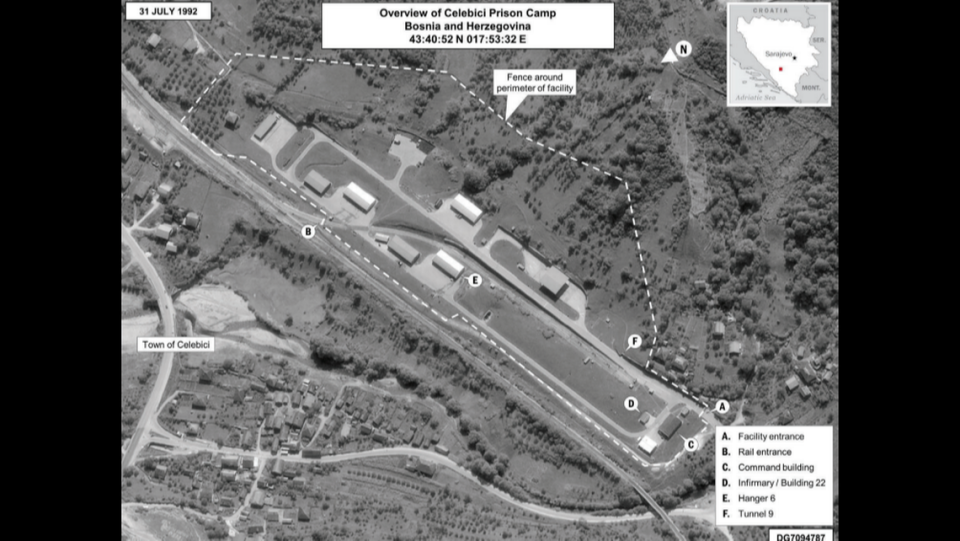Prison camp guard accused of war crimes pretended to be refugee to enter US, feds say
A man tried to bury his past as a “particularly vicious” Bosnian prison camp supervisor by pretending to be a refugee fleeing from persecution, federal prosecutors said.
Doing so allowed him to enter the U.S. in 1999 as a refugee — before becoming a U.S. citizen in 2009 — after he oversaw a notorious prison camp during the Bosnian war in Bosnia and Herzegovina in the 1990s, according to officials.
More than a dozen survivors of the Celebici prison camp, where Serb prisoners were held, have accused Kemal Mrndzic, 50, of beating, abusing and threatening prisoners, court documents show.
Some survivors said Mrndzic practiced karate on prisoners, according to an affidavit.
Mrndzic, who lives in Swampscott, Massachusetts, about 15 miles northeast of Boston, was arrested on May 17, according to the U.S. Attorney’s Office for the District of Massachusetts.
He’s facing charges of “falsifying, concealing, and covering up a material fact from the U.S. government by trick, scheme, or device; using a fraudulently obtained U.S. passport; and possessing and using a fraudulently obtained naturalization certificate and fraudulently obtained Social Security card,” prosecutors said.
Mrndzic posted a bond of $30,000 and was released after his initial court appearance in Boston, prosecutors said.
McClatchy News contacted his attorney for comment on May 18 and didn’t immediately receive a response.
Man accused of taking part in camp’s ‘most notorious mass beating’
A brutal war involving crimes against humanity and genocide broke out after Bosnia and Herzegovina declared its independence from the former Republic of Yugoslavia in 1992, the affidavit says.
The country’s civil war lasted until 1995 and involved three ethnic groups: Bosniaks, or Bosnian Muslims; Serbs; and Croats, according to the U.S. Holocaust Memorial Museum. The war involved Bosnian Serbs’ campaign of “ethnic cleansing” against Bosniaks and Croatian civilians.
Mrndzic, a Bosniak, supervised guards at Celebici prison camp — where Bosniaks and Croats detained “non-combatant” Serbs, including older men and a “small number of women” — from June to December 1992, according to the affidavit.
Guards there “committed numerous murders, rapes, and had engaged in torture and other forms of persecution of Serb prisoners,” according to the United Nations International Criminal Tribunal for the Former Yugoslavia (ICTY), officials said in a statement.

The ICTY ultimately convicted three of Mrndzic’s fellow guards of crimes at a trial in The Hague, Netherlands, prosecutors said.
According to camp survivor testimonies and recent interviews with Homeland Security Investigations agents, Mrndzic is accused of taking part in the camp’s “most notorious mass beating” in August 1992 after the International Committee for the Red Cross visited the facility, the affidavit says.
The purpose of the beating was to punish prisoners for telling Red Cross representatives about the camp’s harrowing conditions, according to the affidavit.
After one prisoner collapsed from a severe beating, Mrndzic is accused of grabbing his hair, saying “no one would leave the camp alive” and using an ethnic slur against him, the affidavit says.
The man pretends to be a refugee
After the Bosnian war ended, ICTY investigators interviewed Mrndzic in Sarajevo, the capital of Bosnia and Herzegovina, and accused him of war crimes at Celebici, prosecutors said.
Then, Mrndzic fled to neighboring Croatia, where he applied to enter the U.S. as a refugee, according to prosecutors.
He’s accused of lying and saying he was captured, imprisoned and beaten by Serb forces in 1992, according to the affidavit.
He pretended to be the “target of the type of persecution which he perpetrated on others,” the affidavit says.
He also lied about wanting to join his half brother, who didn’t actually exist, in Massachusetts, according to the affidavit.
On March 22, 2022, Homeland Security Investigations agents found Mrndzic at his home in Swampscott where he admitted he was a guard at Celebici prison camp and lied on his refugee application, the affidavit says.
He also denied abusing camp prisoners, according to the affidavit.
Mrndzic could be sentenced up to 10 years in prison each if convicted on the fraudulently obtained passport charge as well as the fraudulently obtained naturalization charge, prosecutors said.
He could be sentenced up to five years in prison for each of the other two charges against him, the release said.
About 100,000 people were killed during the Bosnian war, which ended when NATO carried out a “bombing campaign,” resulting in the Dayton Accords peace agreement in 1995, according to the U.S. Holocaust Memorial Museum.
Security worker threatened to ‘blow all the Democrats up’ at campaign office, feds say
Kidnapped man’s family pays ransom, then his body is found zip-tied in alley, feds say
Three charged in Nigeria-based ‘sextortion’ ring that led to teen’s suicide, feds say

